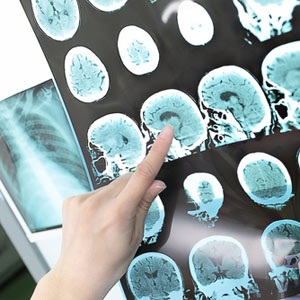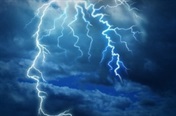
Hospitalisation
Most patients who have suffered a stroke will be hospitalised immediately. Fluids will administered to the patient intravenously to prevent dehydration.
Patients often will undergo physiotherapy to prevent pneumonia. Special care is taken to reposition patients frequently to reduce the chances that they develop bed sores.
Rehabilitation is usually started in hospital and continues from home once the patient has been discharged.
In certain cases emergency neurosurgery is necessary to remove blood clots or to repair a ruptured aneurysm.
Specialised treatment
The time of the onset of a stroke to entry into an assessment and treatment protocol should be reduced. A number of conditions need to be ruled out, including cardiac valvular lesions, epilepsy, meningitis, encephalitis, bacterial endocarditis, cerebral abscess, vasculitis, alcoholism, drug abuse, neurofibromatosis and tuberous sclerosis.
By means of neurological investigation, identification of either a carotid artery or vertebral-basilar stroke pattern needs to be determined as management is different. Prognostication is possible by this approach.
Selected patients with non-haemorrhagic ischaemic infarcts respond to r-TPA (intravenous thrombolytic therapy) given by experts in the field. Hypertension must be carefully managed to prevent haemorrhagic transformation in the stroke region. Ask your health caregiver about this option. Only about 10% of patients with stroke will be able to receive such a treatment, which should be given in a dedicated stroke unit. Major contra-indications to giving TPA include uncontrolled hypertension, large strokes and drowsiness.
Modern transthoracic echocardiography (ultrasound) is effective in identifying intra-cardiac thrombi, valve vegetations, valvular stenosis or insufficiency. Trans-oesophageal echocardiography may also be needed to evaluate the left atrium (heart chamber) for the presence of clots. These conditions need separate specialised heart treatment to prevent recurrent stroke due to thrombi that dislodge from the heart into the cerebral circulation.
Aspirin in pharmacological doses reduces the incidence of stroke and death in susceptible persons. Ticlopidine is a new alternative to aspirin for stroke prophylaxis (prevention). Side-effects, such as bleeding, need consideration. In general use of anticoagulants such as warfarin is not useful unless there is a clear indication such as atrial fibrillation associated with risk factors for stroke.
Atherosclerotic narrowing of the carotid (neck) arteries is an important cause of stroke. Narrowing may be graded as mild, moderate or severe. The degree is determined by duplex doppler ultrasound testing. Patients with a high-grade stenosis (narrowing) of between 70-99% are at risk of stroke. One or both carotid arteries (i.e. on both sides of the neck) may be partially or completely occluded (shut by clot). There is no effective surgical treatment if the carotid artery is completely blocked. Patients with symptomatic high-grade stenosis or recent transient ischaemic attacks (TIA) will benefit from vascular surgery. This means that the narrowed segment is widened surgically by an operation termed carotid endarterectomy.
Once complete, this procedure is complete, the patient usually will be at a reduced risk of further strokes but the procedure itself is associated with risk of death and stroke, although both are relatively rare. This aspect must be considered when giving informed consent for the operative intervention.
In specialised units, carotid stent angioplasty, may be an alternative treatment to carotid endarterectomy. However, the precise role for stenting is unclear, and research trials are underway to obtain more information
Patients with cerebral ischaemia due to recurrent cardiogenic and embolic strokes (originating from the heart) need anticoagulation, in the form of warfarin.
Oral contaceptives: oestrogen increases the risk of clotting, and oestrogen-containing oral contraceptives should be discontinued in women who have had a stroke.
Consideration to modifiable stroke risk factors is important. Special care should de directed at diabetes (control), hypertension (pressure levels), atrial fibrillation and hyperlipidaemia (need cholesterol lowering statins and Mediterranean-type diet). Statins act independently to reduce the risk of stroke, and patients with TIAs or strokes should receive a statin and 150 mg of aspirin daily unless contraindicated.
Stroke following aneurysmal subarachnoid haemorrhage, has an acute mortality rate of 50%, and a recurrence rate of 50% in the first six months. Identification and treatment of cerebral aneurysms are important.
Rehabilitation
When the patient leaves the hospital, recovery and prevention of further strokes are discussed. This includes changes in diet and lifestyle, ongoing drug treatment and possible surgery.
People who are at risk of bleeding strokes will be advised to keep a check on their blood pressure. If high blood pressure caused the stroke, the patient will have to continue taking medication to control high blood pressure.
Rehabilitation is an important aspect of stroke treatment. It is aimed at enhancing the brain’s efforts to recover and helping people resume as many as possible of their pre-stroke activities. Rehabilitation may involve physical, occupational and speech therapy. The success of rehabilitation depends on the support of family and caregivers. Although rehabilitation has a lot to offer stroke victims, it should not raise unrealistic expectations of a full return to the state of health they had before.
A factor that enhances the success of rehabilitation is gentle but regular aerobic exercise, such as swimming.
Stroke victims often feel depressed and angry. Psychological care can help them cope and increase their tolerance to disability.
(Reviewed by Dr J. Carr, FCP(SA) Neurology, MSc(Med))
Read more:
Symptoms of a stroke
Diagnosing a stoke
Risk factors of having a stroke




 Publications
Publications
 Partners
Partners












